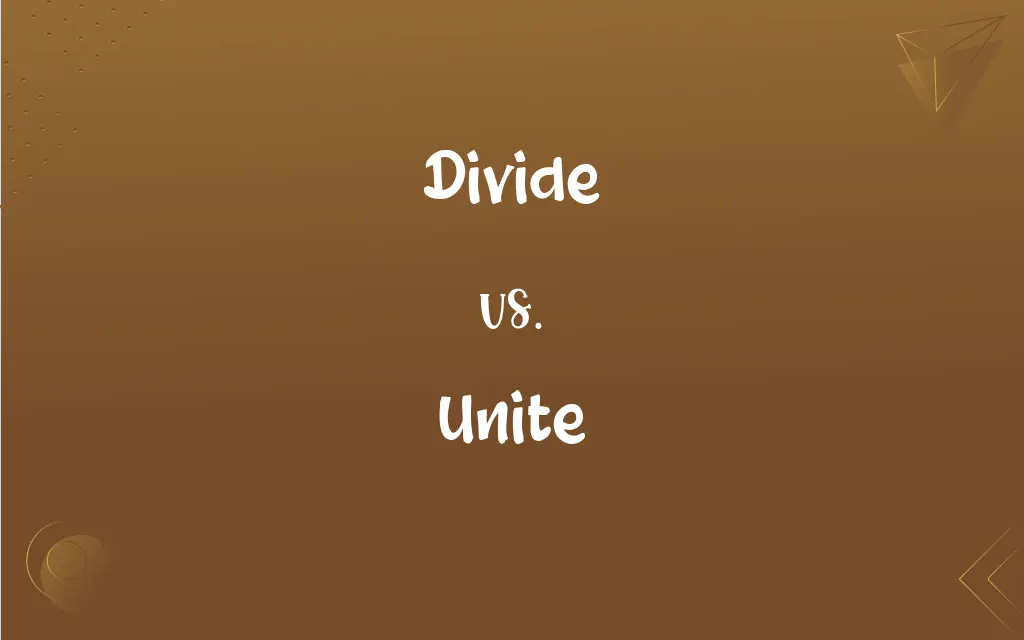Divide vs. Unite: What's the Difference?
Edited by Harlon Moss || By Janet White || Published on January 5, 2024
Divide refers to separate or split into parts. Unite refers to bring together or join as a whole.

Key Differences
Divide implies separation into parts, fractions, or groups, often highlighting differences or distinctions. Unite, in contrast, refers to the act of bringing together disparate elements, fostering a sense of harmony and collaboration. Both processes are fundamental to understanding complex systems, whether in nature, society, or thought.
To divide often means creating boundaries or distinctions, leading to isolation or segmentation, while to unite means to bridge gaps and build connections, aiming for cohesion and solidarity. Both actions play crucial roles in social dynamics, impacting how communities interact and function.
In mathematics, divide is a fundamental operation that partitions a number into specified quantities, whereas unite is not a mathematical term but metaphorically can imply the amalgamation of concepts or values, merging them into a unified theory or understanding.
In linguistics, divide can refer to the categorization of language elements, whereas unite may describe the synthesis of linguistic components into a coherent system. Both are essential for the comprehensive study of languages.
In psychology, divide can denote the differentiation of mental processes or identities, whereas unite signifies the integration of psychological aspects into a cohesive self-image. Both are integral to understanding human behavior and mental health.
ADVERTISEMENT
Comparison Chart
Function
Separates elements into distinct parts
Brings disparate elements together
Connotation
Often negative, implying conflict
Generally positive, implying harmony
In Mathematics
Refers to arithmetic division
Not applicable in strict mathematical terms
In Language
Categorizes and classifies elements
Synthesizes and integrates elements
In Social Context
Creates distinctions and barriers
Fosters connections and unity
ADVERTISEMENT
Divide and Unite Definitions
Divide
In mathematics, to perform division.
When you divide 20 by 5, you get 4.
Unite
To cause to adhere or combine.
Heat is used to unite the ingredients into a mixture.
Divide
To share something by portions.
We divided the pizza evenly among the four of us.
Unite
To merge or blend ideas.
The artist united traditional and modern styles in her work.
Divide
To cause disagreement or disunity.
The issue divided public opinion sharply.
Unite
To join together.
The two companies will unite to form a larger corporation.
Divide
To separate into parts.
The river divides the city into two distinct areas.
Unite
To form a single entity or group.
The provinces united to form a federation.
Divide
To categorize or classify.
Biologists divide animals into different species.
Unite
To bring people together for a common purpose.
The crisis united the community.
Divide
To separate into parts, sections, groups, or branches
Divided the students into four groups.
Unite
To bring together so as to form a whole
The different structures are united in a single flower.
FAQs
Can 'unite' have negative connotations?
Rarely, but it might imply forced cohesion or suppression of individuality in certain contexts.
Is 'divide' always negative in mathematics?
No, in mathematics, 'divide' is a neutral term referring to a basic arithmetic operation.
What does 'divide' typically imply in social contexts?
In social contexts, 'divide' often implies creating barriers or distinctions among groups.
Can 'unite' refer to a personal experience?
Yes, like uniting with a lost family member.
Can 'divide' be used positively?
Yes, such as when dividing responsibilities evenly in a team.
Is 'divide' used in computing?
Yes, it's used in algorithms and programming to partition data or tasks.
How does 'unite' function in a political context?
In politics, 'unite' refers to the act of bringing together diverse groups for a common goal.
Does 'unite' always mean physical joining?
No, it can also refer to psychological or conceptual joining.
Can 'divide' and 'unite' relate to personal relationships?
Yes, dividing tasks in a household, uniting in times of crisis.
How do 'divide' and 'unite' relate in an educational setting?
'Divide' can refer to categorizing knowledge, while 'unite' might mean integrating diverse ideas.
How do 'divide' and 'unite' function in science?
In science, 'divide' is for categorization, while 'unite' is for forming theories.
Can 'unite' be used in a negative sense?
Rarely, it might imply coercion or loss of diversity.
Can 'divide' and 'unite' apply to environmental issues?
Yes, like dividing resources or uniting for conservation efforts.
Is 'divide' applicable in art?
Yes, in art, 'divide' might refer to contrasting elements.
Can landscapes or geography divide or unite?
Yes, rivers or mountains divide areas, while bridges or tunnels unite them.
Does 'divide' have a role in sports?
Yes, like dividing teams or strategies.
Are there cultural implications for 'divide' and 'unite'?
Yes, cultural practices can divide or unite groups.
Do 'divide' and 'unite' have roles in religion?
Yes, religious beliefs can divide or unite communities.
In literature, how are 'divide' and 'unite' used?
'Divide' can mean conflict in plot, while 'unite' often refers to resolution or harmony.
How do 'divide' and 'unite' operate in a business context?
'Divide' for delegating tasks, 'unite' for team building.
About Author
Written by
Janet WhiteJanet White has been an esteemed writer and blogger for Difference Wiki. Holding a Master's degree in Science and Medical Journalism from the prestigious Boston University, she has consistently demonstrated her expertise and passion for her field. When she's not immersed in her work, Janet relishes her time exercising, delving into a good book, and cherishing moments with friends and family.
Edited by
Harlon MossHarlon is a seasoned quality moderator and accomplished content writer for Difference Wiki. An alumnus of the prestigious University of California, he earned his degree in Computer Science. Leveraging his academic background, Harlon brings a meticulous and informed perspective to his work, ensuring content accuracy and excellence.































































